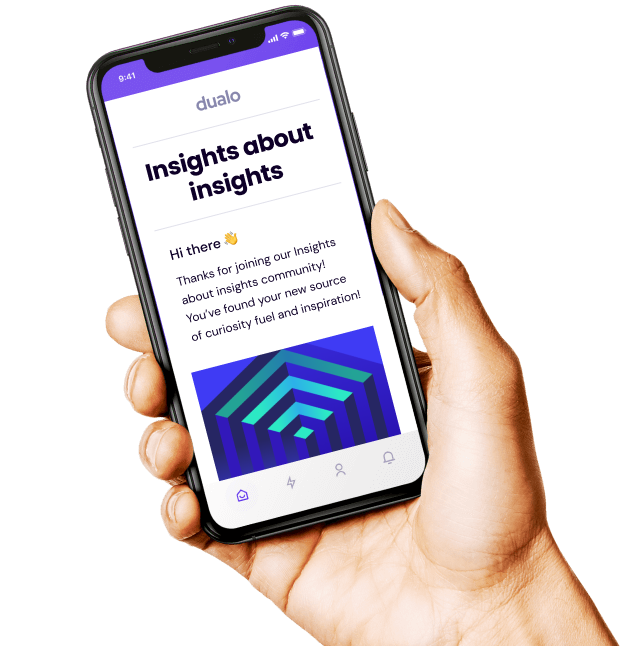Lydia Howland on 'Insight debt'
We caught up with Lydia Howland, former Head of User Research at Deliveroo, and most recently Head of Service Design at Nous, to talk about the idea of insight debt: what it is, why it happens, and how to avoid it.



We caught up with Lydia Howland, former Head of User Research at Deliveroo, and most recently Head of Service Design at Nous, to talk about the idea of insight debt: what it is, why it happens, and how to avoid it.

We caught up with Lydia Howland, former Head of User Research at Deliveroo, and most recently Head of Service Design at Nous, to talk about the idea of insight debt: what it is, why it happens, and how to avoid it.
Lydia outlines how organisations both large and small are affected by insight debt, highlights the importance of self-serve research, and shares her excitement about the future of research operations as a discipline.
Most people are probably more familiar with the idea of tech debt. The idea that you build a product in such a way that at a certain point in time it comes back to bite you, because of the way you approached and structured the build since the start.
It becomes difficult to unpick and correct things later, and you have to go back and rebuild or reorganise the code that you developed years and years ago in order to move forward, because you've grown so fast that the product is now creaking at the seams.
Well there’s an insight equivalent. One that happens right from the beginning of any organisation’s lifecycle. Because when you're starting out in a small scale startup like I am now, pretty much the only game in town is to get hold of some insight.
Have you found product market fit? Have you identified who your ideal customers are? Are they able to understand your product marketing? Are they able to onboard and sign themselves up for your service? Is the product you’re offering usable?
When you're a small team, you don't necessarily have specialist roles covering all these different things. Everyone's playing a game of Total Football and there's insight coming in at such a high velocity.
And if you haven't got someone whose job or responsibility it is to start thinking about where all this information is going to be kept or how to capture it in such a way that you can reuse it later, insight just keeps flying in and then at certain point in time when you’ve scaled rapidly and become really big, you realise that you’re in trouble.
Suddenly you’ll hit the problem of people asking you ‘What do we know about X?’ and you know that you do know something about X, but you just can’t put your finger on what exactly that is, or find it anywhere, or help direct people towards this.
So insight has an operational element to it: indexing, cataloguing, creating a repository, and being systematic of course. But it also has huge strategic value, in order to prevent you reinventing the wheel and to keep you moving forward as a business.
The short answer is everybody from day one.
In a startup, before you have customers, your biggest asset is the insight you're accumulating. Are you getting closer to being confident that you are a viable business or not; do you have a proposition that people actually want?
Any failure to capture these nuggets of insight is a failure to build up the value of your business, as until you become a trading business your insight is all you’ve got. It’s almost like it’s the only thing you can really put on your balance sheet. And your balance sheet isn’t worth a thing if you can’t remember the code to your account!
So whoever is driving this, most likely a combination of the founders and leadership, it’s incumbent on all of them to make sure this information reflects the actual value you’ve derived from the experiments and tests you’ve been running.
Building up some version of an insights repository, however formal or informal that is, is pretty much the stocktake job of the early stage organisation as it goes on this path towards working out if there's actually gold in these hills - that’s really what you’re in the production of at the early stage, you're in the production of insight.
The irony is that it’s easy to think in the early stages that you can just run forward really quickly and that you're not losing value by not capturing this. You don't even have the sense that you're possibly building up a debt.
But if you have to pivot and you then need to go back or remember what it was you learned that was fundamental about a particular problem, and you can't even source where you discovered something, then you're in a tough situation. And so that's why I say the single most bankable asset that you have at the early stage is the insight you’re gathering.
There's also no shame in starting to capture this in a spreadsheet. It's not the best but it gets you started somewhere. The worst thing you can do is not put it anywhere and just assume it doesn't matter.
When you mature and you become a successful business, there's still going to be the discovery-led production of insight but the emphasis switches over to look more at how people are currently using your product or service and how you generate greater growth.
Speaking to my experience at Deliveroo, when you join a company and you’re greeted with multiple years of insight, the challenge becomes more about making sure that insights have been archived effectively and are easy for people to get hold of.
The human behaviour in large organisations today when searching for knowledge is typically to ask yourself ‘Who do I know that I can ask a question to, and I'll go make a request for this information’.
But then the job for the person being asked for research is to go back and forth finding everything we've done about that, synthesising this and condensing it down for the stakeholders who’ve asked for it.
Your job as the researcher becomes more of an archival job for stakeholders when you're actually supposed to be discovering and integrating new original insight and research for the product roadmap.
This is when insight debt becomes less about whether you’ve archived knowledge properly and more about how you help people self-serve this information. So that the researchers you've brought in to help the product team with their roadmap aren't overwhelmed by constant requests for previous research.
We never found a brilliant tool that would let people self-serve insight because there were always limitations, that is until Dualo came along. I’m excited for what you’re developing because it’s a solution that allows anyone to quickly search and filter for insights without having to go to the researcher first.
The only other thing I would say is that everyone talks about being user-centric, but that hasn’t always been the case. Though, I do think this battle has now been won as most people today understand the value of understanding what users think, feel and do.
The exciting thing for me, in having had a relatively long career and the luxury of working at Deliveroo, is seeing the evolution of research operations as a discipline.
And the next battle to be won is for people to recognise there’s this whole separate skillset and a growing community of practice that’s not about actually running fieldwork, but is precisely about how you operationalise research.
Those at the vanguard of user research are realising the value of operationalising research over time and at scale. Research operations really is the new and exciting space to be within the industry.
It'll be exciting to see how things in this space like the very active ResearchOps community and the precipitation of tools like Dualo evolve, as these will be the next big things that are really going to elevate the value of research.
Because most people now, from Designers to Product Managers, can run a useful usability session. However the big value add is really about how you amplify those efforts into a body of work that has value in the longer term.
Most of us are all researchers now, and that's great. The tools have been democratised, the skill has been somewhat democratised. But the amplifying effect of research really sits with research operations now, and that's I think where the big wins for the discipline are going to come in future.

Dualo is an insights hub used by digital product teams to get more repeatable value from their user research and insights, so that stakeholders can make informed and timely decisions across the organisation. If you're interested in learning more, please request a demo and a member of our team will be in touch.
Join our growing community and be the first to see fresh content.
.svg)
Repo Ops ideas worth stealing
.svg)
Interviews with leaders
